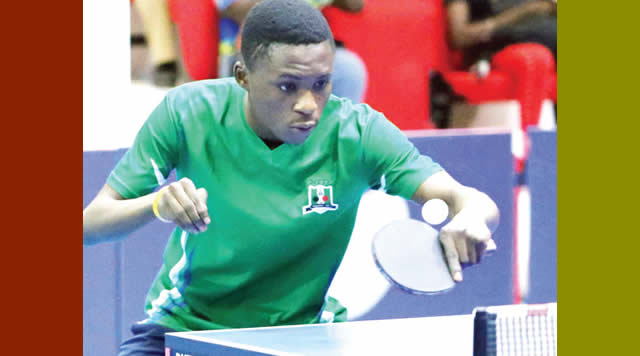Taiwo Mati, a rising star in the world of table tennis, candidly shared his journey, struggles, and aspirations in a recent interview. From his humble beginnings in Ondo State, Nigeria, to competing in prestigious international tournaments, Mati’s path has been marked by both triumphs and setbacks. He currently plays in the highly competitive French Pro B league, a deliberate move to elevate his game and face tougher opponents. Although initially challenging, Mati has adapted to the French league and is seeing positive results, including a recent victory against a top-ranked league player. His journey is a testament to his dedication and resilience.
Mati’s career highlights include a bronze medal at the 2021 World Championships in the men’s doubles, marking him as the first Nigerian to achieve such a feat at any World Championship level. He also reached the round of 32 at the 2023 World Championships, further solidifying his position on the global stage. However, his journey has not been without its share of difficulties. The most significant blow came in 2024 when personal issues and a drop in ranking points led to his missing the Paris Olympics. This setback deeply affected him, but with the support of fellow athletes and his coach, he found the strength to persevere and continue training, focusing on a future comeback.
Despite the disappointment of missing the Olympics, Mati remains optimistic and committed to his sport. He finds particular joy competing in Africa, citing the 2023 World Championship in Durban, South Africa, as a highlight due to the overwhelming support he received from fans and fellow African nations. This sense of belonging and encouragement fuels his drive to succeed. Mati’s immediate goals include participating in more World Table Tennis (WTT) events to regain ranking points and visibility. He acknowledges the financial burden of these tournaments, which he currently self-funds, and hopes for a breakthrough performance that will change his trajectory.
The financial strain of competing at a high level is a significant challenge for Mati. Attending WTT events, even within Europe, can cost upwards of $1,200, a substantial sum for an athlete without sponsorship. The lack of financial support limits his opportunities to compete and train at the level necessary to reach his full potential, a source of frustration for the talented athlete. He acknowledges the disappointment of knowing his abilities are constrained by external factors, but remains determined to persevere, hoping for a change in his circumstances. Despite these difficulties, Mati remains resolute, emphasizing his commitment to the sport and his refusal to give up on his dreams.
Mati also addressed the pressure of being touted as Aruna Quadri’s successor. He dismisses the notion of fading away, emphasizing his resilience and determination to bounce back from a difficult season. He sees his struggles as a temporary setback and draws inspiration from other top athletes who have faced similar challenges and returned stronger. He remains confident that he will regain his prominence in the sport, emphasizing that it is only a matter of time. He highlights the importance of the Nigeria Table Tennis Federation (NTTF) in his career, acknowledging their support throughout his journey from junior to senior level. He appeals for continued support, emphasizing that even partial funding would significantly alleviate the financial burden and allow him to focus on his training and performance.
Mati believes the NTTF plays a vital role in nurturing young table tennis talent in Nigeria. He commends their efforts in organizing events like the WTT Lagos, which provides opportunities for home-based athletes to compete against international players and gain valuable experience. He also appreciates the increased frequency of national tournaments, which contribute to the growth and development of the sport within the country. However, he suggests improvements, particularly in athlete welfare. He emphasizes the importance of federations providing support and checking on athletes’ well-being, especially during challenging periods. He believes that a more proactive approach to athlete support would greatly benefit athletes facing setbacks and help them navigate difficult times.


